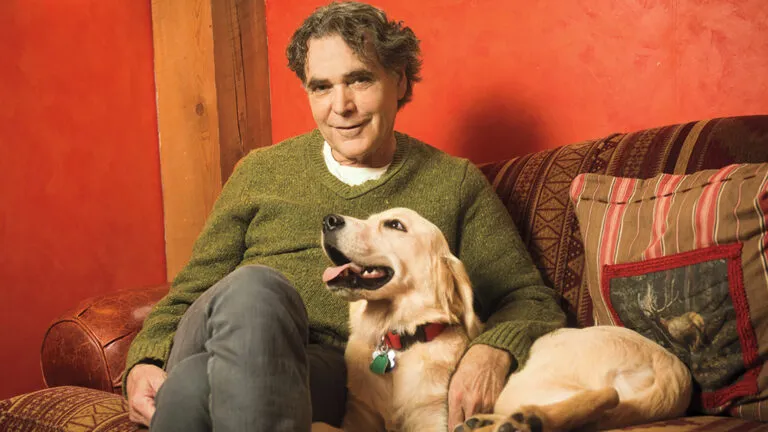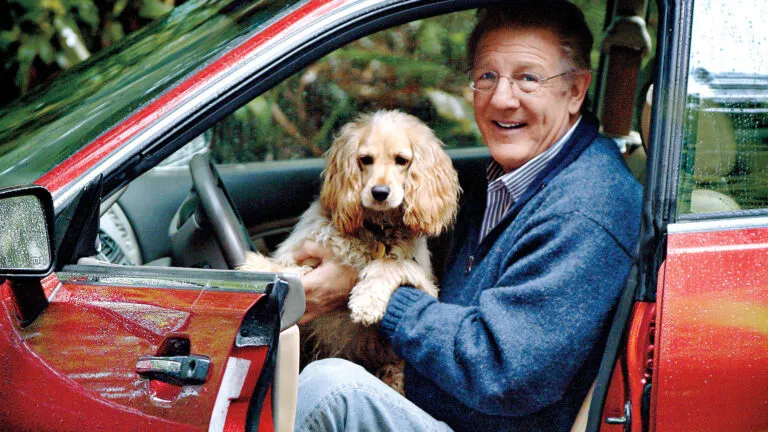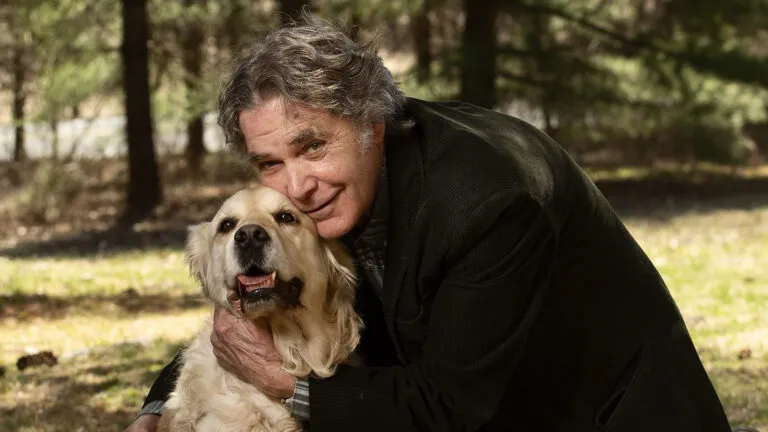Chances are, if the face of an adorable dog on a book cover or a movie poster has made you smile, W. Bruce Cameron is the man to thank. His best-selling books and three hit movies—including the latest, A Dog’s Journey—portray the dog–human bond with humor and poignancy. The prolific author, producer and screenwriter gives new meaning to the term dog lover: His marriage, career, life philosophy and technique for getting to know the neighbors all center around a passion for pups.
When and how did you become a dog lover?
I was eight years old, around the age when Burke meets Cooper in A Dog’s Promise. My father opened the backyard gate one day and in bounded a Labrador puppy. I don’t remember meeting any dogs before then. We ran toward each other like twins separated at birth. That dog, Cammie, was my favorite creature on the planet from that moment on. She escorted me through my childhood and was at my side for knee skinnings, creek wadings and sled runs. She died when I was in college and just taking the faltering steps toward manhood. Perhaps she felt her job was done.
How did the story for your first dog book, A Dog’s Purpose, come about?
I was driving up the coast of California with a woman, Cathryn, who had recently lost her dog. She turned to me and said, “I will never have another dog.” I was just starting to get serious about Cathryn, but the whole no-dog thing was a deal breaker for me. I decided to tell her a story to convince her that if her heart was open to it, her dog would come back to her. She liked the story so much that she married me! And yes, we got another dog.
How did that story change your career?
It changed my life in so many ways. Now I’m the “dog book guy,” when before I was the “humor book guy.” Obviously the books and movies have elevated my profile, but even more important, my younger reader series has, according to teachers and parents, given many reluctant readers a reason to love reading. I feel I’m doing good in the world.
Why do you think people need help coping when a pet dies?
Because a dog is like a child in so many ways—a child who doesn’t talk back. Dogs love us, depend on us, look to us for guidance and help. Losing a pet means losing this devoted creature, and it cuts a real hole in our hearts. The notion that our friends might come back to us—if we only know where to look—has helped many people cope with their loss.
Tell us about discovering that A Dog’s Purpose would become a film.
I had been through the development process with 8 Simple Rules for Dating My Teenage Daughter, which was a hit show on ABC, so I thought I knew what to expect. Instead, A Dog’s Purpose went into a dark room somewhere for more than half a decade. I had given up hope when I heard there was renewed interest. It was one of those long teases with positive news but no action, so by the time it resurfaced as a project I had become so skeptical I didn’t really believe it was happening until we arrived on set.
How did you learn to be a screenwriter?
Cathryn had a long career as a TV writer and screenwriter. When I sold 8 Simple Rules into development, my deal included a writing assignment for a screenplay based on the book. I had never written a screenplay, so I turned to Cathryn for help, and we still write together to this day.
In A Dog’s Way Home, you and your wife insisted that the dog star be a rescue. Why?
We and producer Gavin Polone made it an absolute requirement that the star of the movie be a rescue, because we wanted to demonstrate that these dogs can do anything. And it’s undeniable—Shelby, the star of A Dog’s Way Home, was living in a junkyard when animal control picked her up. We flew down to Tennessee to meet her and fell in love. She is sweet, loving, and motivated to work—human actors aren’t always as cooperative! I actually wrote a younger reader novel, Shelby’s Story, based on her incredible trek.
You’ve written seven books geared toward children. Why do you feel kids can relate to dog stories?
Everyone of every age can relate to a dog. Some younger reader novels skew in different gender, racial or cultural directions, and there’s certainly nothing wrong with that. But kids also want to read the same novel everyone is reading, and that’s where a dog point of view can help. The stories are approachable, relatable, funny and heartwarming.
Tell us about the dog you have now.
Tucker is a cocktail of various DNA samples, like a drink made by a bartender pouring a little from every bottle into the blender. He very much informed the character of Jake, the dog in my Repo Madness series. Like Jake, Tucker hates to go for a walk. A dog who doesn’t like to walk! He also doesn’t really love dogs. He adores cats if they run away, otherwise he ignores them to the best of his ability. Mostly he loves people. I’ve learned the names of a lot of the neighbors on my block because of Tucker. It’s a pretty good trick.
Earlier this year the movie adaptation of A Dog’s Journey came out. What do you hope audiences took away from it?
I’m hoping people will realize that love is a search and that those who love us the most will always try to track us down. In A Dog’s Journey, Bailey has a mission to find his person and to protect her as she makes some bad decisions throughout her life. I believe we will always be reunited with those we love.
A Dog’s Promise was published in October. What can readers expect
A Dog’s Promise continues the story of the original dog soul in A Dog’s Purpose and A Dog’s Journey, but with a very special twist. Bailey is back because his boy, Ethan, needs him to do something extremely important—something only a dog can accomplish. It’s possibly the most intriguing and exciting of any of the books!
Find out more about W. Bruce Cameron’s books and films at wbrucecameron.com.





